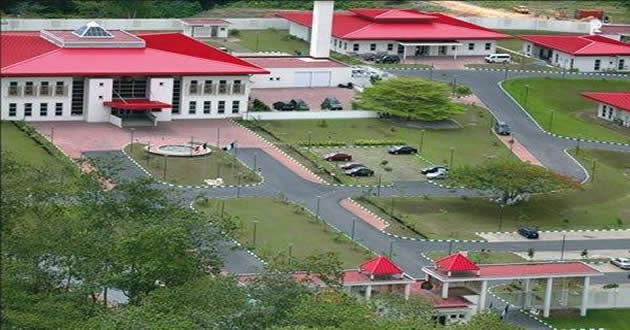
Latitude: 4.6591 to 5.2888 Lat (DMS) 4° 39' 33N to 5° 17' 20N
Longitude: 7.8552 to 8.0996 Long (DMS) 8° 5' 59E to 7° 51' 19E
Elevation (Feet): 830
Population Est.(2006): 290697 From Uruan Abasi to Uruan Okok
Zip Code: 520107
History:
Uruan people have continued to maintain a good relationship with their neighbors; and have fervently clung to their heritage. Their seven clan structure is still being maintained. This is the structure depicted during the coronation and burial of the Edidem Atakpor, the Nsomm of Uruan, by the presence of seven traditional bow-men, seven spear-men, seven sword-men, and seven royal staff-men each of which represent Essien Uruan.
There are seven races of Uruan :
(1) Akwa Uruan, which is made up of: Nturukpum, Esuk Odu, Ibuno Issiet, Issiet Inua Akpa, Use Uruan, Issiet Ekim, Ekim Enen, Afaha Ikot, Ikot Nkanga, Ama Odung, Ikot Owot, Esuk Issiet and Obio Nkan.
(2) Etongko Mkpe Uruan, made up of: Ifiayong Obot, Obio Obot Osong, Osong, Akpa Utong, Ibikpe, Ikot Udo, and Mbiaya.
(3) Mutaka Uruan, comprised of: Ekpene Ibia, Ikot Edung, Ibiaku Issiet, Obio Ndobo, Ikot Akpa Ekang, Ikot Akan and Adadia.
(4) Ekondo Uruan, comprised of: Ibiaku Ikot Ese, Ndon Uruan, Ituk Mbang, Ekpene Ukim, Ndon Ebom, Esuk Inyang, Nung Ikono Ufok, and Nung Ikono Obio.
(5) Mosongko Uruan, made up of: Akpa Mfri Ukim, Esuk Anakpa, Ufak Obio Uruan, Akani Obio Uruan, Obio Akwa Akpa Uruan, Esuk Idu, Ikot Etuong, Ifiayong Esuk, Nwaniba, Mbiakong, Ifiayong Usuk, Eman Ikot Udo and Idu.
(6) Ibonda Uruan, comprised of: Edik Ikpa, Eman Ukpa, Anakpa, Nna Enin, Ikot Inyang Esuk, Nung Oku and Ikot Oto Inyie.
(7) Akpe Iboku Uruan, made up of: Ibiaku, Eman, Utit, Ita, Ikpa, Ikot Oku and Esuk Ikpa.
The principal deity of Uruan people is Atakpor, which was brought from Southern Cameroun, and believed to be a Great Mother deity that associates with water. The Atakpor was regarded as female deity and as an intermediary through which Uruan people could communicate with Abasi (God). Today Uruan people believe that this Great Mother deity lives in that body of water now known as Akwa Akpa Uruan (The Mighty Sea of Uruan).
Other aspects of Uruan heritage include Ekpe, Ekong (War), Nka (Age-grade), Ebre, Fattening Home (Nkugho), and so on. Uruan people developed the idea of Ekpe society and used Ekpe as an instrument for maintaining law and order, and for entertainment. There are various grades of Ekpe, such as Nyamkpe, Nkanda, Mbökkö, Ibom, etc. The Ekpe members of higher grades are known for their display of Nsibidi, a secret writing or signs used for communication among the members. The Ekong is a traditional warrior society used for encouraging chivalry or bravery among men in Uruan. It was developed as an instrument for checking social ills, and fostering security and unity among the people.
The Ebre was a traditional society used by women for social and political control, and for promotion of women rights. Nka (Age-grades) in Uruan were used for effective performance of different aspects of community work, mutual help and for discipline of their members. Uruan people developed Uruan language which they derived from the proto-language. It is a variant of languages spoken by Ibibio groups. Uruan language is what has for historical reasons been referred to as Efik language, and as already mentioned, Uruan and Efik are all Iboku people.
According to Uruan historians, like Dominus Essien of UNIUYO and Edet Akpan Udo of “Who Are the Ibibios”, Uruan people are believed to have migrated in different waves from East-Central and South Africa to Uruan Akpe in the area now called Idombi in the Rio del Rey near South Western Cameroun and Cross River border where they settled for centuries. Due to the first Batanga war which caused economic and social disorder in the region, Uruan people migrated to area in the Cross River Basin called Akani Obio Uruan in about 8th century A.D. The river near the settlement was named Akwa Akpa Uruan meaning (Mighty River of Uruan).
It is believed that in the 13th century, a hundreds of Uruan people, another Iboku group who also migrated through a different route joined their kindred at Akani Obio Uruan and Akpa Mfri Ukim. Due to geographical and ecological problems, such as frequent floods, Uruan people migrated again further to the mainland and occupied an area now known as Uruan Local Government Area in Akwa Ibom State.
Due to social conflicts between some clans within Uruan, Akpe Iboku people of Uruan, now Eburutu tribe, later nicknamed “Efik” migrated from Uruan Country (Essien Uruan Itiaba) to such places as Creek Town (Uruan Esit Edik), Duke Town (Uruan Ibuot Utan), Henshaw Town (Nsidung). Till today, some Efik families still treasure their connections with some Uruan villages, such as Esuk Odu, Issiet, Mbiaya, Ibiaku Uruan, Adadia, Ndon Ebom, Ekpene Ibia and others, most of which still speak Efik language.
Of original twelve traditional clans, only seven largely unrecognized clans remain today. Others are believed to have settled among the Ibibios such as Ekpene Ukim village in Nsit Ubium and Ikpa village in Eket. To date, these villages still maintain strong bond with their Uruan kindreds.
Banks in Akwa Ibom
Brief History of Akwa Ibom
Business and Economy
Festivals and Carnivals
General and Teaching Hospitals
Hotels and Guest Houses
Local Governments & LCDAs
Akwa Ibom State Ministries Agencies and Parastatals
Police Stations
Popular Markets
Prominent Towns
Restaurants, Bars, Night Clubs
Shopping Malls
Akwa Ibom State Executive Council
Tourist Attractions
Traditional Rulers




